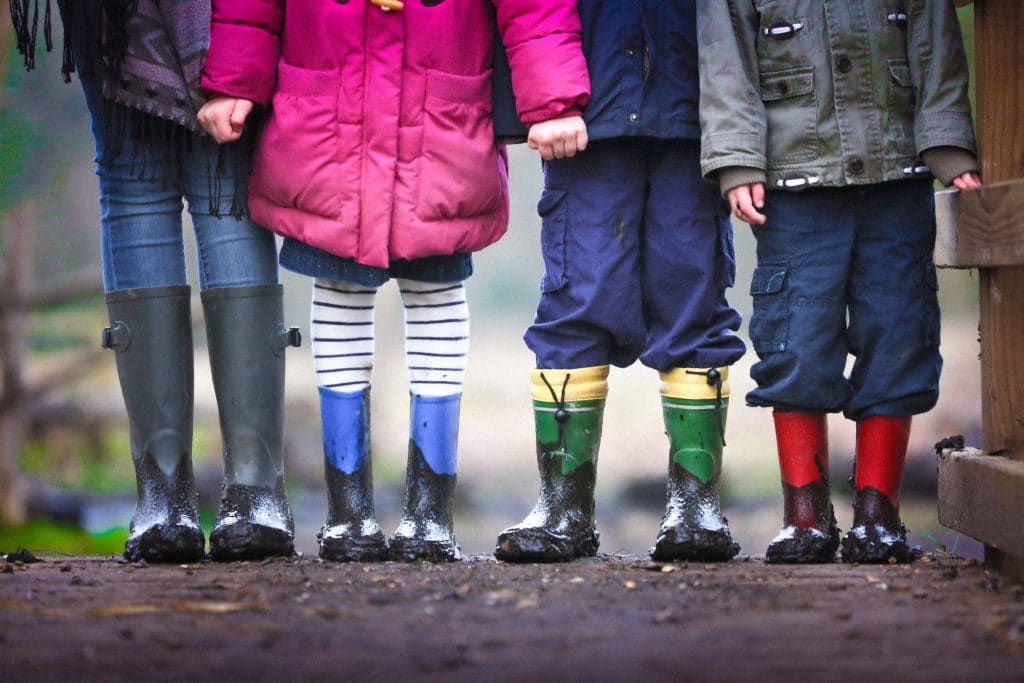How to talk to your kids about the war in Ukraine
By Susan D’Agostino | March 31, 2022
 The science says that children experience better mental health outcomes when their caregivers talk with them about difficult subjects, including war and nuclear threats. Credit: Ben Wicks. Unsplash license. https://unsplash.com/photos/iDCtsz-INHI
The science says that children experience better mental health outcomes when their caregivers talk with them about difficult subjects, including war and nuclear threats. Credit: Ben Wicks. Unsplash license. https://unsplash.com/photos/iDCtsz-INHI
Your children know about the war in Ukraine. And they’ve perceived the gravity of the word “nuclear” from other kids and adults in their lives. When they enter the grocery store, the words “war in Ukraine” greet them in larger-than-normal fonts on print newspaper headlines. While scrolling on Instagram and TikTok, they’ve seen bombed-out buildings and bloodied bodies. They have heard President Vladimir Putin remind the world that Russia is “one of the world’s nuclear powers” and warn of catastrophic consequences “never seen in your entire history.”
“Unless your children live under rocks, they know about the war in Ukraine,” Robin Gurwitch, a senior advisor to the terrorism and disaster program of the Duke-UCLA National Center for Child Traumatic Stress, said.
But many children may not have their facts straight about the war or nuclear threats. And even if they do, those facts may leave them feeling anxious, worried, or confused. Parents and caregivers may want to shield children from this global trauma, but the science says that children experience better mental health outcomes when their parents and caregivers talk with them.
“There’s a danger in denying the authenticity of children’s fear in the service of seeming to console,” Robert Jay Lifton, a psychiatrist at Columbia University, said.
Here’s a round-up of advice for parents, who may be experiencing their own war-induced distress, as they seek to help children navigate unsettling times.
Start a conversation. You might begin by asking your child what they have heard about the war. If your child responds, “I’m fine,” Gurwitch suggests following up with a question about what their friends are saying. Your child may be more at ease answering a question about their friends—and that view may provide a window into your child’s thoughts.
Starting a conversation “requires what parenting always requires and what parents always do imperfectly,” Lifton said. “That is, be sensitive to what your child feels and respond with warmth and reassurance, without negating their feelings.”
If you and your child watch a distressing news item on the war, you could share that the story upset you and ask how it made them feel. Gurwitch acknowledges that the how-did-that-make-you-feel question may sound trite, but it offers an on-ramp to conversation.
Parents who signal that they are available to talk about difficult topics like war send a message that they are available to talk about difficult topics in general, according to Gurwitch. That may pay dividends over time when your child encounters other challenges, such as academic difficulties, online bullying, or peer pressure around recreational drug use or sex.
That said, conversations about this war should not be “one and done,” according to Gurwitch. “Keep checking in because this war may go on for a while.”
Listen, validate, and respond with honesty. “When children talk about war, they’re really checking in on whether they’re safe,” Gurwitch said. Your child may be worried about how close they are to the fighting or about the safety of a family member in Ukraine or the region. They may be trying to make sense of the behavior of a classmate who is a refugee or the target of war-adjacent taunts due to their heritage. They may be reading about the war before bed and having bad dreams.
“Parents aren’t therapists of their kids. Rather, they’re nurturers of their kids,” Lifton said. As a nurturer, you are better positioned to comfort or offer practical assistance when you understand their specific concerns. If you learn that your child misunderstands an aspect of the war, for example, your gentle correction may offer reassurance. Keep in mind that younger children may not want as much information as older children.
Don’t lie as “kids are very sensitive to honesty,” according to Lifton. “Try to explain things as you understand them, in the most simple and direct language.” You may not be able to quell all of their concerns, but you can help them navigate complicated emotions.
“Worry about the war is not all bad—it means that a child has empathy,” Mary Alvord, a psychologist, told the American Psychological Association. The key is not to let fear overwhelm your child.
When addressing a child’s fears, Lifton recommends clear language such as: “The nuclear threat is real, and I understand why you’re afraid. I’m afraid too, but I, along with my friends and my partners in whatever life endeavor I have, am doing whatever possible to avoid that kind of nuclear threat or prevent the weapons from being used.” Your explanation can be tailored to your child’s level of understanding. Keep in mind that your tone of voice matters.
“When has saying ‘don’t worry’ ever worked for adults?” Gurwitch said. “It doesn’t work for children either.” This is especially true with regard to what Lifton calls “end-of-the-world” fears such as nuclear threats, climate change, and pandemics.
“A very simple but not-to-be-forgotten point is that a certain degree of nuclear fear is appropriate,” Lifton said. “[Children] can’t help but sense or hear the word ‘nuclear’ as something larger than ordinary war,” Lifton said.
That does not mean that children should be immobilized by fear. You can validate their concern without amplifying it. Young children should not be exposed to repetitive news feeds featuring the war’s gruesome details. “If they’re watching it over and over and over again, it’s happening over and over and over again [in their minds], which can really elevate anxiety and worry,” Gurwitch said.
Model self-care, compassion, and resiliency. Breaks from news of the war, if possible, provide respite and opportunities for connection, according to Gurwitch. She recommends interspersing conversations about fears with activities like taking a walk, playing a family game, cooking a meal together, or watching a silly (rather than serious) show.
“Children should have a right both to express fear and to change the subject,” Lifton said. He also underscored the value of pursuing ordinary activities even as the war unfolds in real time.
Doom scrolling on social media and reading extremely partisan or fake news are not good for anyone, including children. For kids who want to stay abreast of world events, Common Sense Media provides recommendations of legitimate, kid-friendly news sources.
Conflicts can often spread negative stereotypes about regions or groups of people from varied backgrounds. “This is an opportunity to have conversations about your values on how we treat people,” Gurwitch said. “This may be a window into a bigger conversation.”
If your child shows symptoms of significant distress, such as sudden changes in sleeping or eating habits, irritability, physical aches or pains, or preoccupation with violent media, the American Psychological Association recommends seeking support from a pediatrician or child psychologist.
Look for—and be among—the helpers. “When I was a boy and I would see scary things in the news,” Mr. Rogers, the kind-hearted American children’s television host in the last decades of the 20th century, once said, “my mother would say to me, ‘Look for the helpers. You will always find people who are helping.’”
Some criticize Mr. Rodgers’ “look for the helpers” advice, especially when directed at adults because it appears to foster passivity. But Gurwitch feels strongly that it offers sound advice for children—its original, intended audience—in the midst of war.
In the current war in Ukraine, mothers in Przemysl, Poland left strollers at a train station for refugees and their babies fleeing the war. Romanian border police and citizens left stuffed animals on a pedestrian bridge for Ukrainian children fleeing their homeland. Many individuals, humanitarian organizations, and governments around the world are hard at work in efforts to reestablish peace.
Children of all ages often want to and can help. They can organize fund raisers, donate gently used toys or clothing, or write letters to service members or government officials. Helping can give children a sense of agency in difficult situations—such as a war set against the backdrop of a global pandemic and climate crisis.
“Be as sensitive as you can in the process, but you won’t find a magic formula or a single way that’s foolproof of [addressing your child’s fears],” Lifton said. “There are a lot of individual judgments and also a requirement for parents to think about how they [themselves] are feeling.”
Together, we make the world safer.
The Bulletin elevates expert voices above the noise. But as an independent nonprofit organization, our operations depend on the support of readers like you. Help us continue to deliver quality journalism that holds leaders accountable. Your support of our work at any level is important. In return, we promise our coverage will be understandable, influential, vigilant, solution-oriented, and fair-minded. Together we can make a difference.
Keywords: Russia, Ukraine, children, climate change, nuclear risk, nuclear weapons, war
Topics: Analysis, Nuclear Risk, Nuclear Weapons















Excellent article, Susan. Many readers may be too young to recall classroom exercises in the 1950’s in which we practiced hiding under desks in the event of a nuclear blast. Seeing video of the nuclear blast on TV, I asked myself if hiding under a desk would really help? My point is this, don’t under estimate the age at which children can think logically, critically. Your article points out that children’s fears and concerns should not be ignored, I wholeheartedly agree. As parents, grandparents and guardians we have an inviolable responsibility to discuss our children’s fears, and pray we finish… Read more »